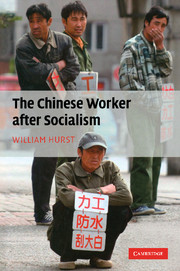Book contents
- Frontmatter
- Contents
- List of illustrations
- Preface
- Introduction
- 1 Regional political economy and labor reform
- 2 The roots of unemployment and the political economy of lay-offs
- 3 Remaking China's urban welfare and labor market policies
- 4 Pathways to re-employment
- 5 Contention, protest, and social order
- Conclusion
- Appendix: List of interviewees
- Bibliography
- Index
Introduction
Published online by Cambridge University Press: 02 July 2009
- Frontmatter
- Contents
- List of illustrations
- Preface
- Introduction
- 1 Regional political economy and labor reform
- 2 The roots of unemployment and the political economy of lay-offs
- 3 Remaking China's urban welfare and labor market policies
- 4 Pathways to re-employment
- 5 Contention, protest, and social order
- Conclusion
- Appendix: List of interviewees
- Bibliography
- Index
Summary
After three decades of reform, China acquired a commanding presence on the world stage. Growth was astounding, as China became the workshop to the world, an important player in world financial and industrial markets, and a recipient of jobs outsourced from advanced industrial countries. China in 2008 bore little resemblance to the poor and unstable bastion of autarky and charismatic revolution that took its first cautious steps toward reform and opening in 1978. But there was another side to this great transformation.
China's impressive gains brought significant social dislocation, in particular for groups that had been winners under socialism, but found themselves losers in the new post-socialist order. Such groups were “victims in a social system that still insists that they are the true rulers.” This book explains how one such group – laid-off state-owned enterprise (SOE) workers – became dislocated, the social and political effects this had, and patterns of workers' contention and resistance.
The scale of social disruption was unprecedented even in China. Between 1993 and 2006, more than 60 million jobs (a total nearly equal to the entire population of France) were lost in Chinese SOEs and urban collective sector enterprises. This represented a net downsizing of more than 40 percent of formal sector urban jobs over less than 15 years. Despite efforts of the Chinese central state and its local agents, re-employment for these displaced masses was difficult to achieve, leading many dejected workers to wonder, “with nothing to eat, can this still be called socialism?”
- Type
- Chapter
- Information
- The Chinese Worker after Socialism , pp. 1 - 15Publisher: Cambridge University PressPrint publication year: 2009



